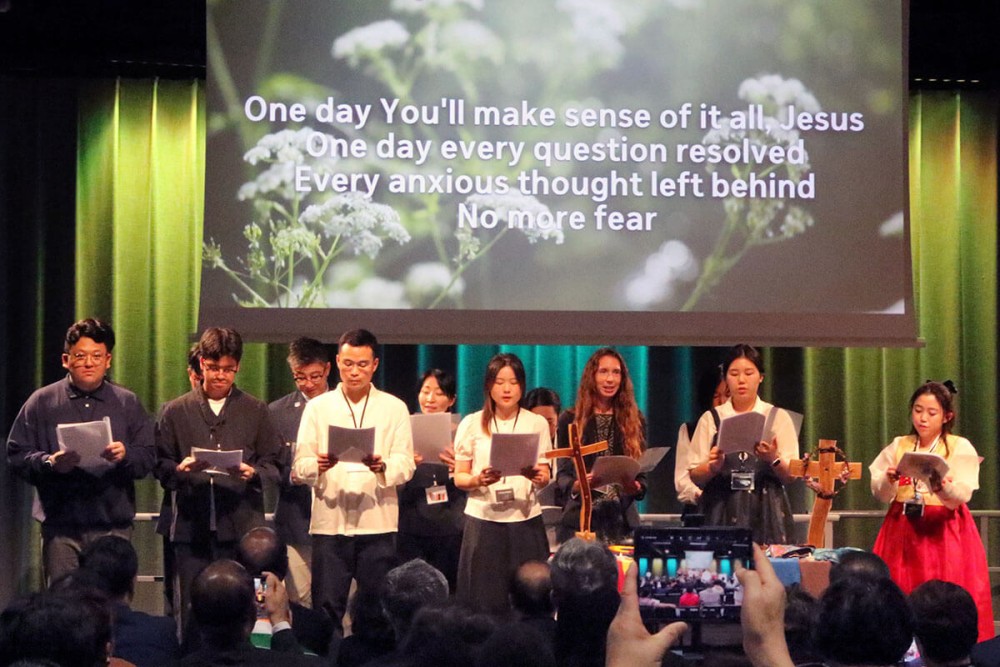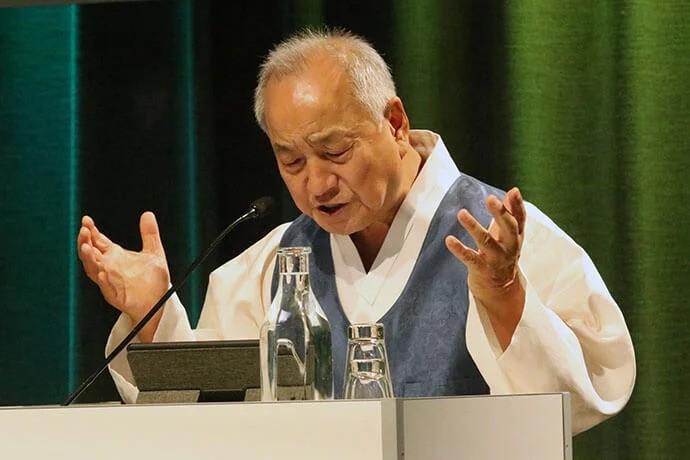World Methodists gather for Korea Peace Night

Young Methodists from around the world sing at the Korea Peace Night gathering held August 15 in Gothenburg, Sweden. (Photo by Thomas E. Kim, United Methodist News)
More than 250 young adults, leaders of world Methodism, and the top executive of the World Council of Churches gathered to speak out against wars and racism during Korea Peace Night, held on August 15 at the World Methodist Conference in Gothenburg, Sweden.
Roland Fernandes, the top executive of the United Methodist board of global ministries, welcomed the participants and said that representatives from the Korean Methodist Church, the UMC, and the World Methodist Council reaffirmed their commitment to peace on the Korean Peninsula, which they made at the 21st World Methodist Conference held in Houston in 2016.
“I am confident that Korea Peace Night will significantly contribute to a deeper understanding of the Methodist vocation as peacemakers,” he said. “I wish you a meaningful and enriching time of reflection and discussion as you explore shared spiritual foundations.”
Dong Hwa Tae, general secretary of the UM general board of missions of the Korean Methodist Church, expressed concern that the political and military situation on the Korean Peninsula is more severe and critical than ever and called for a time of commitment to peace.
“I hope tonight’s Korea Peace Night will be a time when Methodists worldwide come together to pray and commit to ensuring that the news of war ceases and peace is heard,” Tae said. “I pray that the light of peace spreads far and wide this evening.”
Jong Chun Park, president of the World Methodist Council, reminded the participants that they don’t have to be heroes for peace, but called on them to do the small things they can do right now, such as praying for peace and building bridges between North and South Korea.
“The first and foremost step for small peace at this moment on the Korean Peninsula is to stop evil-speaking against the so-called ‘main enemies’ of each other such as ‘Reds (communists)’ and ‘US puppets,’” Park said.
Jerry Pillay, general secretary of the World Council of Churches, shared a message of solidarity for peace and reminded the participants that the date of the event was significant; itmarks the 79th anniversary of the liberation of the Korean Peninsula from Japanese occupation. He pledged to stand in solidarity with the Korean people and the Korean church for peace.
“Our journey may be long, our path uncertain, but our ongoing ecumenical pilgrimage ever seeks justice, peace and reconciliation among all Koreans and all nations,” he said. “We pledge ourselves to that sacred journey with the Korean people and its churches for as long as it takes.”
The voices of young Methodists from different countries who came to lead for Korea Peace Night stood out. Young adults from South Korea, Palestine, and Denmark led prayers for peace.
Maria Thaarup, an ordained elder of the United Methodist Church in Denmark, shared her motivation for attending.
“I think we don’t acknowledge how important prayer is in changing this world where the wars are going on. When we gather, prayer, fellowship and friendship may be the most important weapons against war,” she said.
Three other young people who participated in the peace pilgrimage gave testimonies from their respective countries.

United Methodist Bishop Hee-Soo Jung prays for God to grant peace on the Korean Peninsula during Korea Peace Night held on August 15 at the World Methodist Conference in Gothenburg, Sweden. (Photo by Thomas E. Kim, United Methodist News)
Lee Hwan-hee from South Korea shared his experience receiving an erroneous text alert from the government saying that North Korea had launched a missile toward South Korea. He said that although it was a mistake, he realized that he could not escape the fear and anxiety of war without unification.
He spoke about the Latin greeting “Si vales bene, valeo,” which means, “If you are well, I am well,” and noted that the well-being of any person is connected to the well-being of everyone. He stated that people need to work together for peace.
Maggie Taylor spoke on the racism that immigrant, Indigenous, and Black communities experience in the US.
“Finding peace in the United States context will come as the result of racial/ethnic minorities working together to advocate for each other,” she said.
Areej Masoud from Palestine shared her story of starting a program called Khayari Women Empowerment to help both Christian and Muslim women build financial security—inspired by the teachings of Christ, who uplifted the marginalized and empowered the oppressed.
“Peace is not the opposite of war; it is the act of creation,” Masoud said. “Peace is a mosaic of many efforts, big and small. It requires us to take responsibility, to act with intention and to create spaces where justice and compassion can flourish.
“As we gather here tonight, let us remember that each of us has a role in this mosaic of peace-building. Let each other’s efforts inspire us to fight for justice in Korea, the United States, Palestine and worldwide.”
Attendees of the event stood in a circle in the room singing “Our Wish”—the national anthem of both North and South Korea—and “We Shall Overcome,” one of the iconic songs of the US Civil Rights Movement. They also wrote and hung up prayers for peace.
In his closing prayer, Bishop Hee-Soo Jung, president of the UM board of global ministries, remembered those suffering from war and division around the world and asked God to grant peace.
“God who wipes away our tears, God who knows the cries in our hearts, please offer peace to the Korean Peninsula,” he prayed.
He noted that there are many countries suffering from war right now.
“The situation of the war has been horrifying for so long that your people are crying. God of forgiveness, in Russia and Ukraine, Palestine and Israel, which are currently at war, and African countries experiencing civil war, there are still many people crying for their safety and peace.”
Katie Paul, pastor at Eden Chapel and Perkins United Methodist churches in Perkins, Oklahoma, read the scriptures for the night.
“The Korean Peninsula peace night was a time of sharing passion and hope for the future,” she read. “The young people who testified to the need for peace in their own contexts were a highlight that reminded us that our contextual work for peace is important. Peace is not complete until it is peace for all.” —United Methodist News





